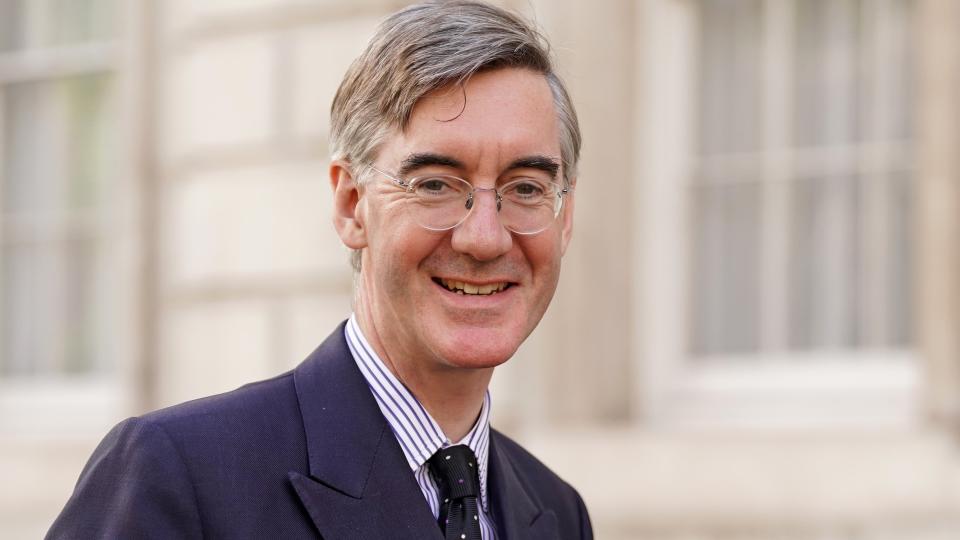Jacob Rees-Mogg says EU red tape ‘revolution’ will not create Wild West

Jacob Rees-Mogg has said a “revolution” to reform EU law retained after Brexit will not turn the UK into the “Wild West”.
The Cabinet Office Minister, responsible for “Brexit opportunities”, said the Government will publish data every three months to show how many changes have been made to the 2,400 pieces of EU legislation in place following the UK’s departure.
But he declined to specify a target for how much remaining EU law on UK statute books would end up being removed or reformed.
Mr Rees-Mogg said the dashboard will ensure the public can “join us on this journey to amend, repeal or replace” retained EU law in a bid to cut at least £1 billion of business costs from “EU red tape”.
Labour said the Government was offering a “digital filing cabinet” of existing legislation, which amounted to nothing more than a “vanity project” on a day when inflation hit 9.1%.
Mr Rees-Mogg, making a statement to the Commons on the eve of the sixth anniversary of the EU referendum, told MPs: “This dashboard I hope is an opportunity to tackle hundreds of matters which might seem marginal on their own, but each of these measures in the margin will combine to usher in a revolution.
“Not a French-style revolution with blood running in the streets and the terror of the guillotine, but a British-style revolution whereby marginal improvements moving inch-by-inch so that soon we’ve covered the feet and the feet become yards and the yards become chains and then furlongs and miles until the journey is complete.
“With inflation running high we need to search everywhere and under every stone and sofa cushion for supply side reforms that make products and services cheaper, make things easier for business and ultimately grow the economy and cut the cost of living.
“This dashboard therefore is the supply side reformers’ El Dorado and, naturally, I am pointing to the treasure trove of opportunity this publication represents.
“It highlights unnecessary and disproportionate EU regulations on consumer goods such as those regulating the power of vacuum cleaners, why should that trouble Her Majesty’s Government?”
Mr Rees-Mogg added: “We will continue working with departments to cut at least a billion pounds of business costs from EU red tape, to ensure greater freedoms and productivity.
“Ensuring we have the right regulation is crucial; excessive and unnecessary regulations which burden business or distort market outcomes reduce productivity, pushing up prices and negatively affecting everyone’s cost of living.”
Speaking to reporters in Westminster, Mr Rees-Mogg hit out at one unnamed department that reported only 2% of retained EU law it would like to reform.
He called such a suggestion “hopeless”.
“We want to really try to make sure that every single one is looked at,” Mr Rees-Mogg said.
“Do I have a particular target percentage? No. But it needs to be a thorough exercise.”
Mr Rees-Mogg said that the move was unlikely to precipitate a fresh clash with the EU over level-playing field provisions in the trade agreement signed in 2020, designed in part to prevent the UK lowering standards to the detriment of the EU.
“I don’t think this will have a particular effect on the level-playing field. I don’t see why it should. We’re not going to become the Wild West, people shouldn’t worry about that.”
He also defended any suggestion that the Government had delayed tackling EU regulations.
“We only formally left two years ago, at which point Covid rather interfered. This is 50 years of accretions to the legal system of the UK.”
Mr Rees-Mogg said the process would not be akin to a “Eurovision Song Contest version of EU laws”, where the least popular regulations are erased first.
Instead, he said that by working incrementally the project would lead to major changes.
He continued: “This is bringing forth elephants, cumulatively.
“Success is actually diligence and it is finding that there are dozens and dozens, if not hundreds and hundreds, of minor obstacles to doing business in this country that we can get rid of.”
Shadow Foreign Office minister Stephen Doughty said: “This simply appears to be a vanity project.
“It’s quite extraordinary that on the day that inflation tops 9%, the cost of energy is soaring, families facing massive pressures wondering how they will put food on the table, prices rising at the fastest rate of increase for 40 years, the Government’s offer today to the British people is a digital filing cabinet of existing legislation, which the gentleman describes, in his own words, as marginal.
“And while the Government plans to cut 20% of civil servants, the minister for so-called Government efficiency is running his own make-work scheme in the Cabinet Office, creating tasks for them to satisfy his own obsessions.”
He added: “The reality is that gimmicks do nothing to address the real challenges that the public face today.”
Mr Rees-Mogg played down any suggestion that plans to reform retained EU law could lead to further clashes over the post-Brexit trading arrangements for Northern Ireland.
“It is very important the benefits of divergence feed through to Northern Ireland. It can’t just be left out in the cold. So this will fit in with the reforms of the protocol,” he told reporters.
However, he stressed that the efforts to catalogue and target longstanding EU law were not “driving” unilateral UK efforts to make changes to the Northern Ireland Protocol, which has provoked a major row with the EU.
The Cabinet Office Minister did acknowledge that the move could potentially prompt different approaches to regulation across the UK, but it depended on “competencies” between the UK Government and devolved administrations.
“The devolved administrations will have authority in their devolved areas, and they will be able to, as Scotland wants to do, follow the EU rules or not follow EU rules.”

 Yahoo News
Yahoo News 